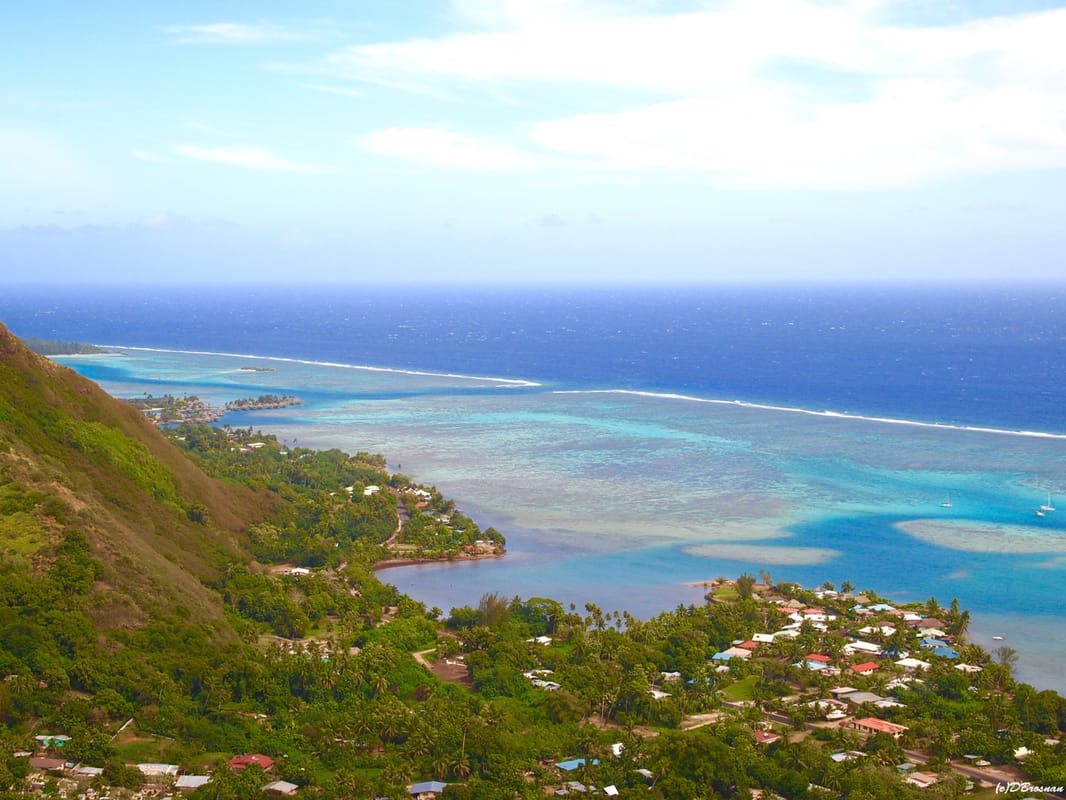|
I recently cruised through French Polynesia and the Cook Islands as an invited speaker on ocean science. Sailing into turquoise lagoons, diving on vibrant reefs, and watching whales and dolphins play—here was Paradise Found. These islands are not immune to climate change effects but I found many fewer vulnerabilities.
Like most ecological scientists, I work in distressed habitats and with communities facing tough choices about their natural and economic resources. I am used to loss being the messenger for action. But here in French Polynesia, the messenger took a new and unfamiliar form—an absence of flagrant problems. Beauty and bounty in Paradise are teaching us three lessons that we must heed today. 1. Natural luck matters. On Bora Bora, I spent time with a guide who was leading a drift snorkel through the reef channel. As we hiked across the landscape to our entry point he described his reasons for living in the islands. Economically, including by developed-world standards, he made a good income from coral reef and nature-based tourism. His personal downtime to rejuvenate was spent surfing or offshore fishing with friends. Family time involved teaching his son to line-fish in the lagoon. This trinity of values—economics, personal well-being, and family—the very attributes that we promote as the basis of healthy individuals, communities and nations, are amply supplied here by ecosystems. There are of course other sources of social or economic benefits in the region but for many, nature is the underlying provider. These islands are volcanic mountains surrounded by wide lagoons and fringing coral reefs. The reef-lagoon system is similar to a castle’s moat and wall, and plays a similar role defending the land from the full onslaught of the Southern Ocean. Large swells sweeping up from Antarctica continuously crash in mountains of white water on the outer fringing reefs. . Without these fringing reefs, lagoons would vanish and shorelines erode rapidly. Corals provide a stability that has allowed communities to build houses, schools and businesses at the waters edge, and has given them easy access to the rich waters. Fertile volcanic soils, a source of high productivity, are stabilized by lush forests. The sense of abundance that permeates the islands springs from their natural legacy. 2. Don’t squander your ecological inheritance Some places are lucky. They have the kinds of natural systems that make them less vulnerable to climate change and hazards. Others are not. The twenty-nine atolls of the Marshall Islands are tragically disappearing. Barely six-feet above sea level and most less than a mile wide, they are already feeling the sharp bite of climate change. Sea level has risen by a foot over the past 30 years, driven partly by changing trade wind patterns. The islands’ pleas for help at Paris CoP21 and since still ring in our ears. The eastern seaboard of the USA is already experiencing coastal inundations and flooding from the dual challenges of land subsidence and rising sea level. The natural luck of places like French Polynesia can be destroyed in an instant. Around the world, poor environmental planning is rampant. There are too many ill-conceived projects, such as the ones that destroy reefs and fail to account for their roles in beach and shoreline protection. Infrastructure that lacks absorption capacity but is built on flood plains can vastly worsen the effects of rain, even causing devastating floods. 3. Understand your own environmental reality, then take action. For three weeks, I shared the ocean’s beauty and magic with travelers who often expressed concerns for the future of our seas. At the end of the voyage, guests returned to the realities of home where they faced challenges of urbanization, environmental destruction, economic worries, socio-political upheaval; all sorts of stresses and fears, of which climate change is one more. And as stresses go, climate change is big and global, so overwhelming that people can feel compelled to ignore it, even if they’d rather not. But along with the souvenirs, selfies, and memories, the islands gave us a vital message to carry with us. By knowing our own environment we have the power to make changes that will matter. How?
Global challenges like climate change are overwhelming. We can’t solve the world’s problems alone, but we can make an important difference where we live. A trip to paradise teaches us why we should. *I was fortunate to explore the Islands as invited expert on board MS Paul Gauguin. Views expressed are my own. Reproduced kindly from Huffington Post http://www.huffingtonpost.com/entry/585cb489e4b068764965bbc3?timestamp=1482506579978
1 Comment
|
AuthorDeborah Brosnan Archives
December 2019
|


 RSS Feed
RSS Feed